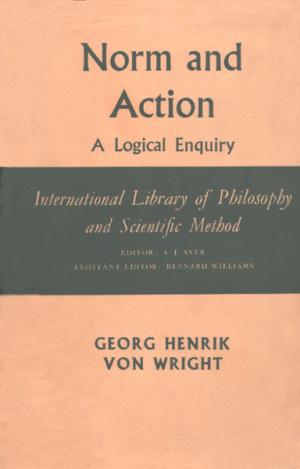Norm and Action contains the first half of the lecture series delivered by Georg Henrik von Wright at St Andrews between 1959 and 1960. As such, much of the material may be read as a necessary foundation and introduction to the material contained in The Varieties of Goodness.
In the first three chapters, von Wright lays out introductory material, offering preliminary explanations of norms, logic and acts. He defines norms as things which govern actions, and divides these into rules, prescriptions, customs, directives, moral norms and ideals. He also draws a logical distinction between action and the ability to act, thereby opening up the idea of forbearance as a distinct category of non-action. From there, the fourth chapter goes on to a closer examination of the logic of action, laying out a formal vocabulary of d and f expressions, where d expressions describe acts and f expressions describe forbearances. The remainder of the volume depends heavily on this vocabulary.
Once this foundational material has been covered, von Wright turns to a closer analysis of norms. He first examines prescriptions, dividing them into commands, permissions and prohibitions. Of special interest to the student of natural theology is his discussion of the authoritative sources of prescriptions (chap. 5, sec. 7). He then devotes close attention to an analysis of the language of prescriptions. He differentiates between language in the imperative mood, the language of morals and the language of norm formulation, and points out that even ordinary indicative sentences can be used as norm formulation. The discussion then turns to the truth value of norms. Von Wright argues that rules and prescriptions are outside the category of truth, though he does not venture to comment on the truth value of technical or moral norms. From this, he moves on to a consideration of the ontological problem of norms, vivisecting the principle that 'Ought entails Can', discussing the logical significance and function of each component word in turn and then applying the principle as a whole to norms, specifically to ideals (‘what a man ought to be he can become’), rules and prescriptions. From this follows a discussion of ‘want’ and the development of the will theory of norms, as well as some discussion of the ability to give and to receive commands.
The penultimate chapters are dedicated to an in-depth examination of deontic (moral) logic, categorical norms and hypothetical norms. Issues of negation, compatibility and entailment between norms are discussed, and a vocabulary of O (obligation), P (permission), and thirty-two elementary types of compound (/) expression is explained. The final chapter turns to consideration of norms of a higher order—norms which are themselves concerned with normative acts, which are of particular import given a situation of hierarchical command. This last chapter lays aside the formal vocabulary which has been developed throughout the rest of the volume in favour of a more informal discussion of normative systems and sovereignty.



